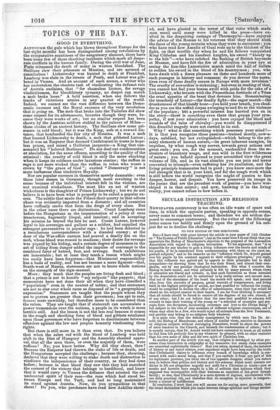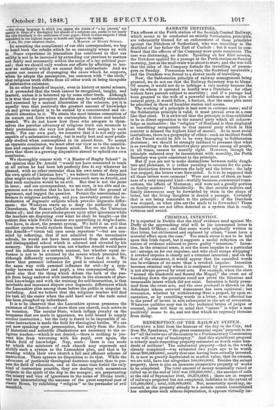SECULAR INSTRUCTION AND RELIGIOUS TEACHING.
NEWSPAPER controversy is too often an idle waste of space and time, in which the opposite parties, speaking in opposite senses, never come to common terms; and therefore we are seldom dis- posed to encourage controversy. But the writer of the following letter comes too °boldly and firmly upon the ground of his sub- ject for us to decline his challenge.
TO THE EDITOR OF TILE SPECTATOR.
SIR-I have read with great interest the article in your paper of 14th October on " The System of Public Education "; but at the same time! do not think that you appreciate the Bishop of Manchester's objection to the proposal of the Lancashire Association with regard to religious instruction. To his argument, that "it is impossible for any teacher to gain a living influence over the hearts and minds of his pupils, if he is interdicted, from communicating with them on the most im- portant subjects," and to his remarks on the "influence which Dr. Arnold gained over his pupils by his constant appeals to their religions principles," you reply, that this influence was gained not by appeals to their principles but to their sympathies—by showing them that he was their friend, and almost their com- panion, not by any peculiar theological instruction. But what I conceive the Bishop to have meant, and what certainly is felt by many persons whose views of education are liberal and catholic, is, that such limitations as those intended by the Association could not be submitted to by really serious and earnest men; that out of the abundance of the heart the mouth will speak; and that persons who, from this sincerity of purpose, genial warmth of temperament, and living faith in the highest principles of action, are best qualified to influence the young, would be compelled to decline the office of schoolmaster, since their lips would be closed on the subject nearest to their hearts. I am far ?rorn thinking it necessary that all minds should be forced to receive all the dogmas of my own church, or of any other•' but I do not believe that the men best qualified to educate will consent to base their training of the young on "a selection of examples and pre- cepts from the Scripture inculcating reverence and love to the Divine Being "; but subject to the veto of nine members of different religious communions one of whom may often be a Jew, who would reject all extracts from the New Testament, and another may belong to no religious body whatever.
It is quite true that the delicate management by which men like Dr. Ar- nold, the Bishop of Manchester, and others of similar views, contrive to discourse on religious subjects without estranging Dissenters, would be above the powers of some teachers in the Church, and beneath the condescension of others; but it is equally certain, that Dr. Arnold would not have consented to teach at all unless he had been left perfectly free to say whatever he pleased, with no other restraint than his own sense of duty and his own spirit of Christian love.
In another part of the article you say, that religion is developed by other pro- cesses than instruction in caligraphy or dry measures: but surely these examples are somewhat sophistically chosen? Had you taken, instead of them, the instance of history or any moral science, your argument might have been met by the truth that Christianity claims to influence every branch of knowledge which is con- cerned with man's moral being, and that if you exclude it from any part of this its legitimate province, you incur one of two opposite dangers: either you reduce men to believe that politics and history and the sciences which most concern our duties in life are altogether ungodly and unfit for a Christian to study—just as monks and hermits have sought in a life of solitude that holiness which they supposed was incompatible with their business as members of the great human family; or else, that Christianity is a mere system of dogmas, unconcerned with our daily practical life, and therefore that its reception or rejection is compara- tively a matter of indifference.
In conclusion, I trust that you will excuse me for saying, more generally, that the broad distinction which you make between things spiritual and things secular —the strong language in which you oppose the duties of "a lay journal," not merely to those ot a theological but almost of a religions one, seems to me nearly the only drawback to the usefulness of your paper; which in other respects I think calculated in the highest degree to benefit and improve its readers.
I am, Sir, your constant reader, A MASTER OF RUGBY SCHOOL.
In accepting the compliment of our able correspondent, we be to hand back the rebuke which he so cunningly wraps up with it. Some experience in journalism has convinced us that our utility is not to be increased by extending our province to matters not fairly and necessarily within the scope of a lay political jour- nal; that we should only weaken our efforts by affecting to bor- row an authority which we cannot fully substantiate. And we accuse our censor of disparaging the cause which he supports, when he adopts the assumption, too common with "the cloth," that religious truth differs from all other truth in being incapable of substantive existence.
In no other branch of inquiry, even in history or moral science, is it pretended that the truth cannot be recognized, taught, and learned, unless it is bolstered up by some other truth. Although it is true that the perceptive faculties may be usefully stimulated and exercised by a mutual illustration of the sciences, yet it is equally true that positively the greatest amount of knowledge on any given subject is: to be earned by a concentrated and ex- clusive attention to it. We attain the most intense conception of its nature and force when we contemplate it alone and unadul- terated. We do not know how those who arrogate to them- selves the peculiar advocacy of religious truth can reconcile to their pretensions the very low place that they assign to such i truth. For our own part, we conceive that it s not only quite capable of a substantive study, but is really best and most profit- ably studied when contemplated in its purest form. To accept an opposite conclusion, we must alter our view as to the constitu- tion and capacities of the human mind. But we are fain to be-. lieve that there is a growing disposition abroad to uphold our own conclusion.
We thoroughly concur with "A Master of Rugby School" in the opinion that Dr. Arnold "would not have consented to teach at all unless he had been left perfectly free to say whatever he pleased, with no other restraint than his own sense of duty and his own spirit of Christian love " ; we believe that the Lancashire plan might exclude the teaching of some such men as Arnold, and that such exclusion would be an evil. But that is not the point in issue ; and our correspondent, we are sure, is too able and in- genuous not to confess that he has in fact shifted the ground of argument, and begged the question. Permit the unrestrained re- ference to religious authority, and you inevitably permit the in- troduction of dogmatic subjects which provoke dogmatic differ- ences: the Wesleyan starts up to deny the authority of the Churchman, the Roman Catholic exorcises both, the Unitarian denies all ; and the poor scholar grows up in utter ignorance while the teachers are disputing over what he shall be taught—as the patient dies while Swift's doctors are quarrelling in Anglo-Latin. You have, in short, the present system. We hold it an evil that another system would exclude from itself the services of a man like Arnold—" virum tali cum corde repertum "—but are con- soled by reflecting, that if not admitted to the unexclusive schools, he would nothave been removed from that orthodox and distinguished school which is adorned and elevated by his memory. But the question was, not whether Arnold would have used his influence in a certain manner, but whether equal in- fluence is not to be attained by the means which procured his, although differently. accompanied. We know that it is. We know that personal influence for good is attained exactly in the same way with personal influence for evil—by a sym- pathy between teacher and pupil, a true companionhood. We know also that the thing which debars the bulk of the peo- ple from being endowed with instruction in the elements of prac- tical knowledge and with the training for self-instruction, is that inevitable and incessant dispute over dogmatic differences which the Lancashire plan among those before the public is singular in excluding. And we believe that the religious teacher will find his task all the easier when the cold hard soil of the rude mind has been ploughed up beforehand.
It is to be observed that the Lancashire system presumes the existence of the Church—of more than one church, each active in its vocation. The secular State, which inflicks penalty on the trespasses that are made in ignorance, we hold bound to supply secular instruction ; but the duty is found to be impossible if se- cular instruction is made the field for theological battles. We are not now speaking upon presumption, but solely from the facts. If historical and scientific illustrations are necessary to the re- ligious teacher,—which is not denied,—there is nothing to pre- vent him from traversing with his pupil, over again, the whole field of knowledge. Nay, more : there is one mode by which the ministers of each church may supersede and nullify such a system as the Lancashire plan, and that is by creating within their own church a full and efficient scheme of instruction. There appears no disposition to do that. While the advocates of particular theological doctrines neglect thus to pos- sess the field of education, and at the same time forbid the only kind of instruction possible, they are dealing with momentous subjects in the spirit of the dog in the manger; are perpetuating the misery and vice of ignorance in the name of Divine truth; and are immortalizing the sarcasm of the great sceptical poet of classic Rome, by exhibiting "religion" as the persuader of evil manifold.



























 Previous page
Previous page